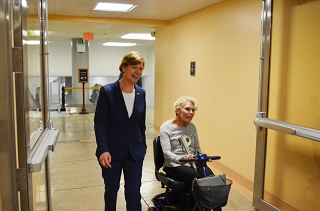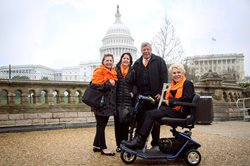
Diane Whitcraft (diagnosed in 1979) with Senator Tammy Baldwin (WI) at the 2019 State of the Union.
Diagnosed with MS in 1979, Diane Whitcraft started getting Betaseron injections shortly after the FDA first approved the drug. For 23 years, this therapy helped to slow the worsening of her disease and protect her brain from damage. However, in September 2016, Diane’s insurance coverage changed and the price of Betaseron went from $11,532 in 1993 to a whopping $82,884 a year. Diane was forced to choose between her health and her family’s financial security.
Escalating drug prices are creating significant barriers to MS treatment. Because of rising drug prices and the design of most insurance plans, a greater financial burden is being put on patients, putting some life-changing treatments out of reach. For Diane, the increase in cost for Betaseron was just too much for her and her husband to afford. “I contacted all the available resources for assistance,” says Diane. “But we do not qualify. I felt guilty that my chronic disease costs us so much.”

Diane Whitcraft and Wisconsin MS Activists at the Society’s 2018 Public Policy Conference
In 2017, Diane was forced to take the last dose of the drug that had helped her successfully manage MS for more than two decades.
New treatments for MS cannot make a difference in people’s lives if they’re not accessible. With drugs coming to market at prices as high as $99,500 per year, it’s important that the Society continues to help combat high drug prices. Our activists are talking to legislators about this issue, as well with pharmaceutical companies about how unaffordable drugs create barriers for patients. Together, with our community of supporters, we amplify the voices of people with MS who are forced to make difficult choices about their treatment.
Since she stopped taking Betaseron, Diane Whitcraft has been tirelessly advocating in favor of lowering prescription drug prices, even connecting directly with legislators to help them understand the effects of policy decisions on people living with MS. Diane is connected with 70,000 other concerned people working to drive change through our MS activist network. This passionate group is standing up to help increase critical government funding for MS research, as well as advocating for new government policies that make medical research, treatment and community support, possible.
"With a condition like MS, I have numerous obstacles to live through. Access to healthcare and having affordable insurance shouldn’t be on the list. Our government needs to support better benefits and continued coverage. How would our officials feel if this terrible and disabling disease struck a family member and they had nowhere to go and couldn’t afford care?"
– Jennifer Dempsey, #MyHealthcareVoice
Diane’s advocacy work to promote better access to medications amplifies a key priority for the Society’s advocacy efforts, highlighted at this years’ Public Policy Conference. The conference brings together nearly 300 MS activists from across the country to educate elected officials in Washington DC about the needs of people living with MS. For Diane, the experience of being an activist has been incredibly rewarding. “MS robs you of some of the things you’re good at,” Diane says. “Being an MS activist gives this disease purpose and gives me an opportunity to do good and help others.”
Advocacy work on behalf of MS patients is absolutely vital to helping people with MS who are in similar situations as Diane. By supporting the Society, you are helping to ensure that those diagnosed with MS have access to the treatments that will help them live their best lives possible.
2019 Advocacy Priorities
1. Access to Medications
2. Surprise Billing
3. Research Funding